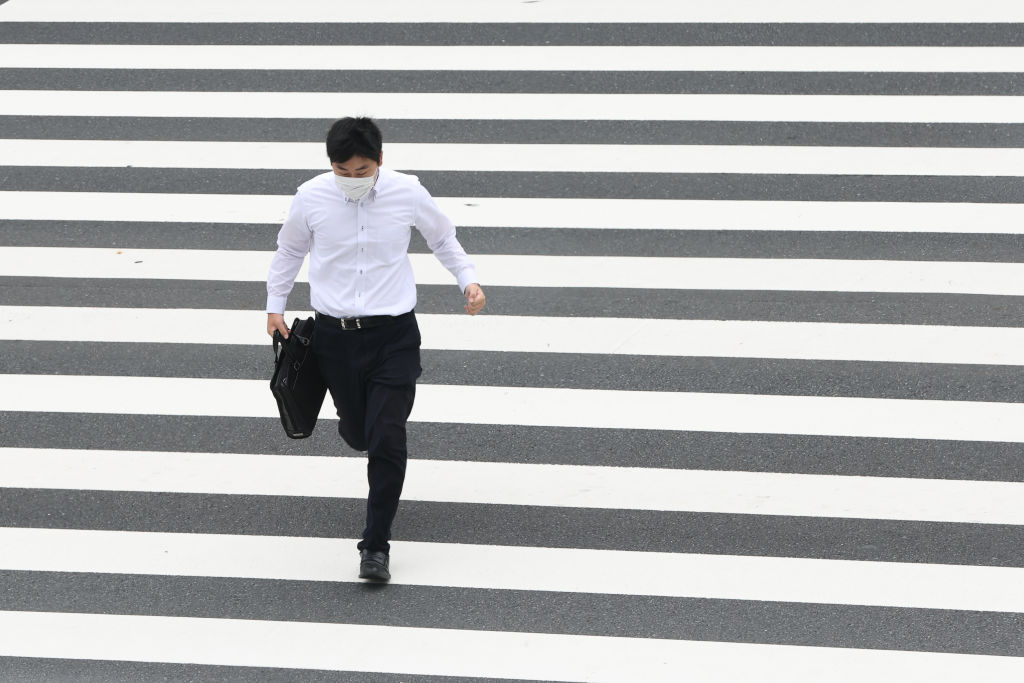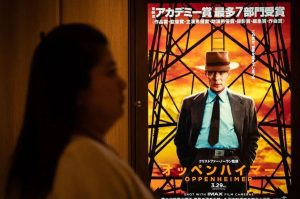Tokyo
If there is one country where the wearing of face masks in response to the coronavirus outbreak has caused no controversy whatsoever, it is Japan. There is no debate about face masks here, and it often seems as if many Japanese would be happy to don the flimsy cloth coverings all year round, regardless of risk. To understand why, it is necessary to consider the history and the culture rather more than the science.
The Japanese have been wearing masks of one sort or another for many centuries. The origin may have been the covering of the mouth with leaves to prevent unclean breath soiling holy artifacts in Buddhist temples in ancient times, a custom still observed today in Kyoto and Osaka.
Mask wearing became popularized during the Edo-era (1603-1868), when relatively expensive face coverings came to be seen as signifiers of affluence. But it wasn’t until the Spanish flu epidemic, which claimed an estimated 450,000 Japanese lives, that face masks became mass-produced and affordable. During World War Two the idea of mask wearing as a civic duty emerged with the appearance of the aikoku masuku or ‘patriot mask’.
The corona crisis has given a further boost to the mask industry with lines round the block at pharmacies, websites crashing, and a lucrative black market emerging in the early days of the virus. There are now masks that can be worn while dining, specially cooled masks to help with the stifling summer heat, and bijin (beauty) masks that accentuate the eyes (apparently). One company is even working on a high-tech ‘smart mask’ for businesspeople that amplifies the voice and can translate speech into eight different languages. Power brokers and influencers have been swift to jump on the bandwagon too: Tokyo governor Yuriko Koike has her own signature range of face masks apparently.
No self-respecting Japanese person would be seen without a face mask today, at least in confined spaces with your fellow citizens in close attendance. And yet, there is almost no compulsion. Apart from a few famous department stores, no one is checking whether you are wearing a mask or not, and there are no penalties for not doing so (Peter Hitchens take note). The worst that can happen is that an excruciatingly polite functionary will make humble and agonized requests for you to mask up, if you would be so kind.
Japanese people’s enthusiasm for masks is rarely ever justified by reference to medical evidence. The most frequently-cited explanation for mask wearing is that it is a courtesy to others; masks are not to protect your own health but that of your fellow citizens. Brad Pitt, at least, was seduced by the apparent selflessness of his face-masked fans to change from a skeptic to true believer on his (pre-corona) visit this year.
More seasoned Japanese watchers might cynically suggest that the true motivation is to signal a concern for the welfare of others, or just to avoid the dread possibility of an accusation of being uncaring, or simply the horror of standing our from the crowd. But perhaps it’s no matter, on such benign hypocrisies are complex yet harmonious social systems built and sustained.
There are other cultural factors of a more practical nature, such as the famous Japanese shyness, or reserve. The mask forms a barrier that discourages unwanted or potentially embarrassing interactions. They are useful too for those lacking confidence in their appearance, which is just about everyone here: a survey from 2011 for Japanese news site News Post Seven revealed that 30 percent of respondents wore face masks to cover up pimples or wrinkles, or just to save on make up.
Perhaps also many Japanese find face masks easier to wear as — and Yukio Mishima wrote a whole novel on this theme — they are so accustomed to veiling their true emotions. Whether it is the blank stoic passivity of the commuting salaryman, or the clenched and pristine but robotically joyless smile of service staff, many people here, it could be argued, wear a mask of some sort, much of the time, so the chance to let the muscles relax for once, behind a cloth covering, and receive a shot of the ‘we’re all in this together’ moral intoxicant at the same time, is irresistible.
***
Get a digital subscription to The Spectator.
Try a month free, then just $3.99 a month
***
As a gaijin (outsider) I’m exempt from much of this. I have forgotten my mask from time to time but not attracted too many disapproving looks. Much as no one expects me to speak keigo (honorific Japanese), I’m excused an obligation that may be more about a deeply ingrained sense of etiquette than genuine concerns for healthcare.
And yet it can still all seem a bit uniform and oppressive, another reminder that though the juxtaposition of the ancient and modern is the tiredest of clichés about life in Japan, it’s the combination of the charming and the maddening that hits home most often. Does nobody actually question the scientific justification for wearing these scratchy flimsy uncomfortable muzzles, or feel the desire on the hottest and most humid of summer days to rip them off and toss them away?
The answer, it seems, is no. But then, this is Japan, and these are probably the wrong questions to ask.
This article was originally published on The Spectator’s UK website.


















